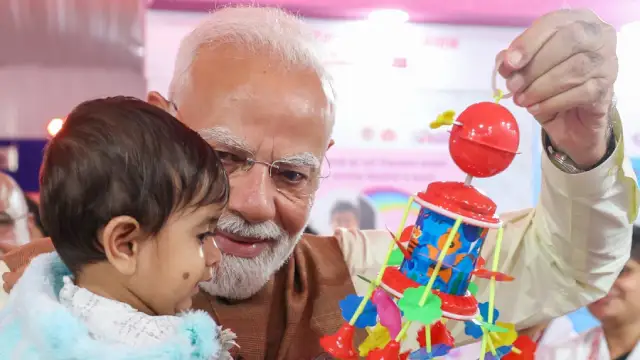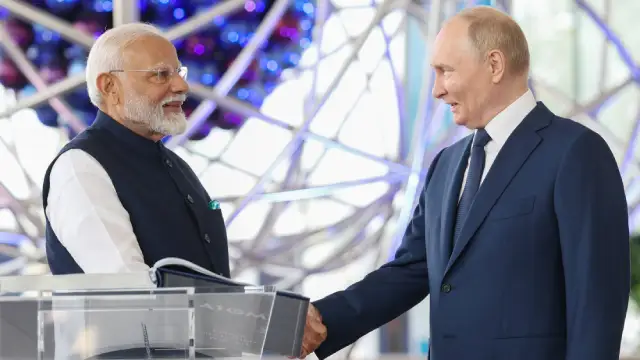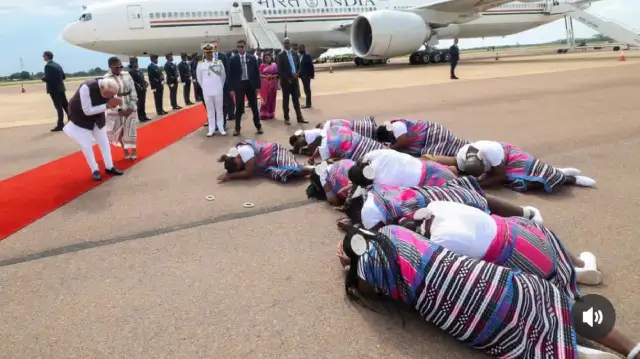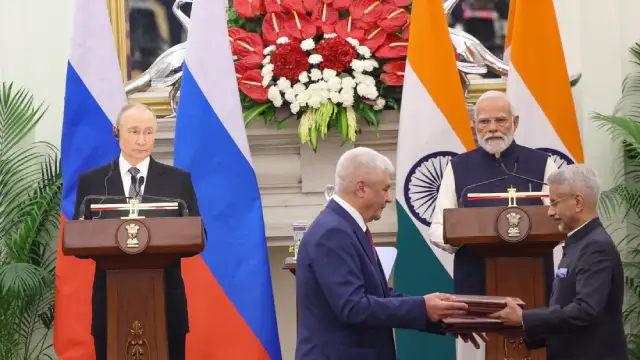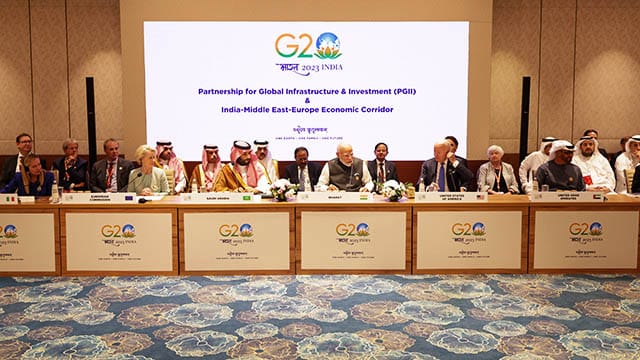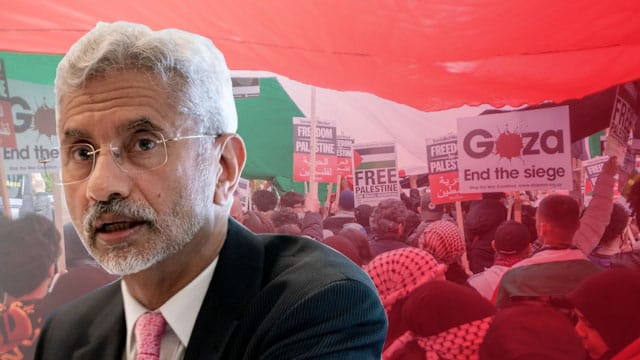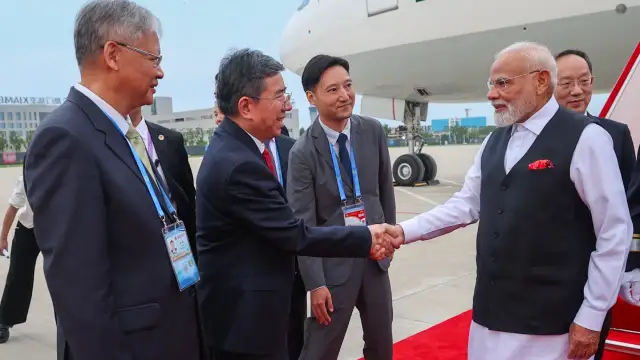Narendra Modi turned 75 on Wednesday. His birthday was celebrated with unprecedented fanfare all over India, with government machinery mobilised to mark the event. The celebrations highlighted India’s distinctive geopolitical position and raised important political questions for the country.
Partners shower affection on Modi on his birthday
Mr Modi thanked all world leaders who wished him on his birthday. The pattern of greetings highlighted India’s current international relationships.
Several leaders from the US-led collective West, starting from European Union President Ursula von der Leyen, Italian Prime Minister Giorgia Meloni, European Council President António Costa, the former British prime minister, Rishi Sunak, and others have wished him.
Thank you Prime Minister Meloni for your warm wishes. Deeply appreciate Italy’s friendship and look forward to strengthening it further.@GiorgiaMeloni https://t.co/u2zNuOT3dk
— Narendra Modi (@narendramodi) September 17, 2025
From Oceania, which is part of the US-led camp, Australian Prime Minister Anthony Albanese, a fellow member of the anti-China military coalition QUAD, and New Zealand’s Prime Minister Christopher Luxon have wished him.
Thank you, my friend, Prime Minister Albanese for your kind wishes. I look forward to further strengthening the India-Australia Comprehensive Strategic Partnership and our close people-to-people ties.@AlboMP https://t.co/j3OChsQRM8
— Narendra Modi (@narendramodi) September 17, 2025
These wishes show how the European Union, QUAD member Australia, and its ally New Zealand need India for different purposes.
Thank you, Prime Minister Luxon, for your warm wishes. I deeply cherish our friendship. New Zealand is an important partner in India’s journey towards Viksit Bharat 2047@chrisluxonmp https://t.co/IHdXAwe98m
— Narendra Modi (@narendramodi) September 17, 2025
While the European Union (EU) is on its way to concluding the proposed India-European Union Free Trade Agreement (FTA), the duo also look forward to the successful implementation of the India-Middle East-Europe Economic Corridor project, which will connect South Asia to Europe via a multi-modal transport network.
The UAE, Saudi Arabia, Israel, and Italy are key partners in the project; among them, everyone, except the Saudi Arabian crown prince, has wished the Indian prime minister on turning 75.
Thank you, my brother, for your warm wishes. I deeply value our close friendship and the mutually beneficial India–UAE partnership, which continues to attain new heights in all areas.@MohamedBinZayed https://t.co/5ve04Nssza
— Narendra Modi (@narendramodi) September 17, 2025
Saudi Arabia, ironically, signed a mutual defence treaty with India’s bete noir, Pakistan, on Wednesday.
However, when Russian President Vladimir Putin and US President Donald Trump wished Mr Modi on his birthday, they drew global attention.
Dancing with the Eagle: Trump calls Modi on his birthday
One of the most crucial parts of Mr Modi’s birthday interactions is his interaction with the US-led collective West. Mr Trump was the first to call Mr Modi to wish him on his birthday.
The prime minister proudly flaunted that Mr Trump had wished him and expressed hope in strengthening India-US ties in the future.
This is the second direct public exchange between Mr Trump and Mr Modi, after the former levied 50% tariffs on imports from India to punish New Delhi for buying oil from Russia.
Speculation suggested that India-US relations had deteriorated following the tariff dispute. However, recent interactions between the two leaders have been positive. These exchanges followed Mr Modi’s attendance at the Shanghai Cooperation Organization’s (SCO) summit in Tianjin, where he was photographed with Chinese President Xi Jinping and Mr Putin.
In both cases, Mr Modi has highlighted his eagerness to develop India-US relations.
In a social media post thanking Mr Trump for his wishes, the prime minister wrote, “Thank you, my friend, President Trump, for your phone call and warm greetings on my 75th birthday. Like you, I am also fully committed to taking the India-US Comprehensive and Global Partnership to new heights. We support your initiatives towards a peaceful resolution of the Ukraine conflict.”
Thank you, my friend, President Trump, for your phone call and warm greetings on my 75th birthday. Like you, I am also fully committed to taking the India-US Comprehensive and Global Partnership to new heights. We support your initiatives towards a peaceful resolution of the…
— Narendra Modi (@narendramodi) September 16, 2025
The emphasis on taking the “India-US Comprehensive and Global Partnership” to new heights imply that India insists on repairing the ties with the US and mitigating the tariff threat, which has caused severe problems for the South Asian country’s exporters.
Mr Modi also carefully mentioned “a peaceful resolution of the Ukraine conflict” to pull an emotive tug. Mr Trump has been excessively focused on resolving the Ukraine conflict to pave the way to his Nobel Peace Prize nomination.
Moreover, he slapped excessive tariffs on India, a close US ally, because he wanted to create pressure on Russia.
Washington knows India won’t be able to bear the pressure and will sacrifice Russian oil to gain access to the US market, which will help its export-oriented sectors to sustain themselves.
Thus, it has used the punitive tariffs to drag India out of the Russian oil barrel.
Yet, Mr Putin also holds the strings. Mr Modi can’t just say no to Russian oil.
The cheap oil from Russia has helped India’s oil marketing companies, and Mukesh Ambani, India’s richest oligarch and perceived as close to the prime minister, to earn huge profits.
To safeguard their interests, Mr Modi has to maintain a balance. This is where he has to face Mr Trump’s wrath.
Caught between the devil and the deep blue sea, while India has intensified its engagement with the China-Russia axis, it has also ensured it keeps wooing Washington.
As India has remained loyal to the West, consistently upholding Western interests and thwarting any efforts by platforms like BRICS and SCO to push for multipolarity, it expects rewards from the West.
However, it’s the first time that a US president, especially the one Mr Modi calls “my friend”, has punished New Delhi for maintaining ties with Russia.
It has also surprised Mr Modi and his far-right Bharatiya Janata Party (BJP). The BJP’s US chapter reportedly used its influence on the US Hindu voters to help Mr Trump win in the 2024 presidential elections. The reason was simple: they thought the billionaire tycoon-turned-conservative would maintain strong bonds with India, but that has not been the case.
Yet, Mr Trump surprised Mr Modi and the BJP with the tariffs, causing ignominy for India’s far-right Hindutva camp.
Ironically, despite having reservations regarding Mr Modi’s government, Mr Trump’s predecessor, Joe Biden, had enhanced strategic cooperation with India.
However, after this zigzag trajectory, Mr Trump apparently exhibited softness regarding India, following Mr Modi’s SCO participation. The prime minister had expressed his jubilation on social media in response.
Later, when Mr Trump wished Mr Modi on his birthday, it provided the prime minister with another opportunity to put forward his demand for a stronger India-US strategic partnership.
Though Mr Xi had mentioned during his bilateral meeting with the Indian prime minister during the SCO sidelines that the dragon and the elephant should dance together, an idiom for China-India collaboration, Mr Modi’s over-enthusiastic reaction to Mr Trump’s occasional messages shows that he is keen to see the elephant dancing with the eagle.
Putin’s Russia takes extra steps to appease
Russia has been relying heavily on India, especially since the beginning of the Ukraine conflict.
While India is one of the biggest consumers of Russian oil, it has also provided a credit line to Russia’s economic projects in the Far East region.
Moreover, despite diversifying its defence basket since Mr Modi’s ascension 11 years ago, India continues to buy weapons from Russia.
Due to economic compulsions, Mr Putin wished Mr Modi on his birthday. The Russian president said that under Mr Modi’s leadership, India is pursuing an independent, sovereign policy while demonstrating impressive economic results.
His statement concealed how Mr Modi sacrificed national interests twice in 2025 — while meeting Mr Trump in the White House in February and during the “Operation Sindoor” in May.
While the Russian president underscored India-Russia ties and expressed hopes regarding his upcoming visit to India, the duo also discussed the Ukraine conflict, the Kremlin reported.
In his message, Mr Modi highlighted the need to quickly resolve the Ukraine conflict, in a bid to appease the West, especially the EU, due to the forthcoming FTA discussion.
Thank you, my friend, President Putin, for your phone call and warm wishes on my 75th birthday. We are committed to further strengthening our Special and Privileged Strategic Partnership. India is ready to make all possible contributions towards a peaceful resolution of the…
— Narendra Modi (@narendramodi) September 17, 2025
As India’s importance is more than economic—Mr Putin needs India to offset China’s influence in multipolar blocs like BRICS and SCO—to Russia, the president not only called the prime minister but also mobilised his diplomatic staff.
Several members of the Russian Embassy’s staff in New Delhi participated in a BJP event celebrating Mr Modi’s birthday, wearing the saffron scarves that resemble India’s far-right Islamophobic politics.
This displayed the amount of Russian desperation to woo Mr Modi and have him by Moscow’s side.
Hindutva-Zionism fraternity
Mr Modi’s birthday, September 17th 1950, was the day when India officially recognised Israel, without establishing diplomatic ties.
This makes the Indian prime minister’s birthday special for Israel.
Against this background, Prime Minister Benjamin Netanyahu wished Mr Modi on his birthday, expressing his hope of enhancing the India-Israel partnership. Mr Netanyahu even expressed his desire to meet the Indian prime minister soon.
Happy birthday to my dear friend, Prime Minister @narendramodi.
— Prime Minister of Israel (@IsraeliPM) September 17, 2025
Together we will take our partnership to new heights.
🇮🇱🤝🇮🇳 pic.twitter.com/hNOiQDOtdw
Mr Modi’s warm thank-you note exhibits double standards in terms of India’s commitment towards peace.
While responding to Mr Putin’s birthday wish, Mr Modi wrote, “India is ready to make all possible contributions towards a peaceful resolution of the Ukraine conflict.”
However, during his social media interaction with Mr Netanyahu, Mr Modi didn’t mention Gaza. Although he has repeatedly paid lip service to the Palestinian cause, following India’s foreign policy, he didn’t criticise or condemn Israel for the Gaza genocide.
Thank you, Prime Minister Netanyahu, for your warm wishes. I deeply cherish our friendship and the enduring ties between India and Israel.@netanyahu https://t.co/LLoykTXncg
— Narendra Modi (@narendramodi) September 17, 2025
While Mr Modi has signed the Tianjin Declaration, where Israel has been condemned, the Indian prime minister reportedly ensured that the word “genocide” isn’t mentioned in the final document.
At a time when Israel faced collective condemnation of the Arab countries for its attack on Qatar, Mr Modi, despite expressing concern regarding the attack, while speaking to the Qatari Amir Sheikh Tamim bin Hamad Al Thani, didn’t name Israel.
Moreover, as the United Nations has now accused Israel of carrying out a genocide in Gaza, where its 23-month-long aggression has killed over 64,000 civilians, India remains silent on the issue.
Mr Modi’s silence on the Gaza peace prospective highlights the duplicity in his advocacy for global peace.
‘Missing friends’
While Mr Modi received a lot of birthday wishes from a lot of foreign leaders, especially those from small countries like Bhutan, Cyprus, Dominica, Guyana, Kenya, Mauritius, Papua New Guinea, Trinidad and Tobago, etc, he didn’t mention receiving any wishes from key European powers like Britain, France or Germany.
There is no information on Canada, or the Latin American countries, including fellow BRICS member Brazil.
Heads of most Arab countries didn’t wish Mr Modi on his birthday, along with Iran and the Central Asian republics.
From the immediate neighbourhood, Bangladesh, Nepal and Sri Lanka’s officials also didn’t wish him.
Above all, China, with which he has reset India’s ties, didn’t wish him.
Experts believe that India’s support for Israeli aggression and the continuous erosion of civil liberties within the country have left Mr Modi isolated not only in the South Asian region but also across the Global South.
It remains to be seen whether, as he approaches 80, Mr Modi can catapult India’s status globally by going beyond his usual laugh and hug manoeuvres.
Join our channels on Telegram and WhatsApp to receive geopolitical updates, videos and more.

